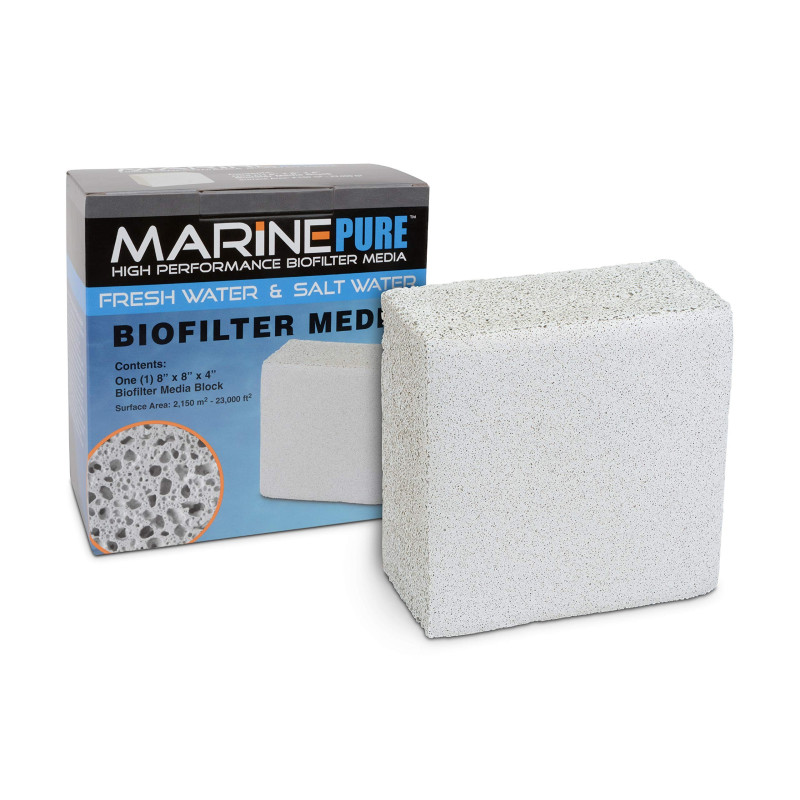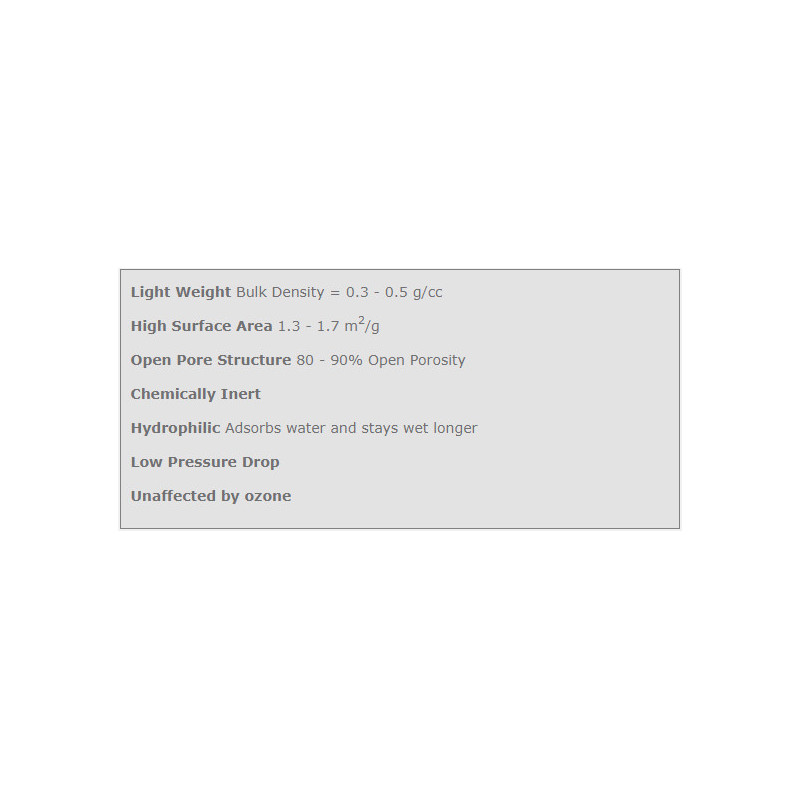More info
MarinePure is designed to be a substrate for bio-filtration, specifically to target ammonia and nitrite removal (nitrification) and to minimize nitrates (denitrification). MarinePure is suitable for both freshwater and saltwater (marine) environments. MarinePure can be used fully submerged or in trickle/shower filters. It should not be used in moving bed filters.
MarinePure® is the perfect place for beneficial bacteria to flourish in order to remove harmful fish wastes.
It will eliminate ammonia and lower nitrates.
MarinePure’s bio-media is the most technically advanced bio-media available today:
> Features Thin Bio-Film Technology™
> MarinePure is inert and will not harm aquarium inhabitants
Why Use MarinePure®?
Better value due to high performance
Reduced tank/pond maintenance
Allows for higher fish loads
Lowers nutrients available for algas
Can use a smaller filtration footprint
More consistent water chemistry
Easy to shape
Variety of Applications
Used in tank
Used in sumps
Used in canister filters
Used in DIY filters
Used in trickle or shower filters
Used in waterfall filters
Used in hang on back filters
Thin Bio-Film Technology™
The combination of vast surface area and open/interconnected pores allows a thin bio-film to develop. This thin film allows bacteria to flourish because necessary nutrients are immediately available. With the open pores, old dead bio-film is easily flushed from the media and will not plug the media. Water flows through the media, not around as with other denser medias, thus utilizing the most surface area for beneficial bacterial growth.
What makes MarinePure bio-media unique?
Its unique combination of large open pores and high surface area. This allows a large amount of bacteria easy access to nutrients (ammonia, nitrite and nitrate) and old bio-film to be easily flushed from the system.
Why is a bio-filter important?
Ammonia and nitrite are very harmful to fish and must be eliminated. A properly operating bio-filter will result in imperceptible levels of both.
What is Thin Bio-Film Technology™ and what does it mean to me?
The open porosity and vast surface area of MarinePure means healthier bacteria colonies and less clogging.
What is the Nitrogen cycle and why is it important?
The most important thing to understand about keeping fish is that it is the bacteria of the nitrogen cycle that make an aquarium tank healthy.
The nitrogen cycle begins when fish are added to the tank. The fish consume protein in their food and excrete ammonia (NH4) in their waste. Ammonia is extremely toxic to fish and will kill them if not eliminated from the tank. There is a bacteria species (Nitrosomonas) that will grow if it can find a suitable home. This bacteria will convert the Ammonia into Nitrite (NO2). Nitrite, while not as toxic as ammonia, is still harmful to your fish. Another species of bacteria (Nitrospira) will convert Nitrite into Nitrate (NO3). Nitrate is not harmful in small amounts and can be reduced in three ways.
By changing out a portion of the tank water each week.
By adding more plants to consume nitrates.
By creating an anoxic environment where special bacteria can thrive and consume nitrates.
The nitrogen cycle is completed when the nitrates are converted into nitrogen gas and returned to the environment.
My friend uses pot scrubbers in her bio-filter, why should I use MarinePure
It comes down to available surface area for bacteria growth. MarinePure has 1000 times more surface area than home plastic remedies. With greater surface area, the supporting bacteria growth is thinner, allowing efficient transfer of nutrients. Your filter and pump components can be greatly downsized saving money. MarinePure will also stay wet longer if flow stops or media is removed from the filter. This property allows the bacteria colony to stay alive longer, preventing the need to re-cycle the filter system. Using MarinePure will make a healthier environment for your fish that will be easier for you to maintain.
How much MarinePure media should I use?
While each system is different with unique flow rates, filter type, bio-loads, etc, you will find you need much less media than traditional bio-media. If adding media to an existing filter, you could use half as much as other medias and still have significantly more capacity. In new systems for the removal of ammonia and nitrites we recommend 1 gallon of spheres or 1 block per 500 gallons. For ponds we recommend ½ cu. Ft. of MP2C per 1000 gallons. For denitrification we recommend 1 block per 150 gallons.
I know MarinePure is effective at removing Ammonia and Nitrites, but will it remove Nitrates?
MarinePure Blocks do an excellent job in supporting bacteria which remove ammonia and nitrite. Bacteria based Nitrate removal is a little more difficult as it is very system dependent. Any media for this purpose needs to be in an anoxic environment (very low oxygen) and have a carbon source available. These conditions are dependent on systems bio-loads and flow rates. Our blocks are thick so the oxygen in the water passing through the block can be consumed before entering the middle of the block. We recommend placing the media in a passive or low flow area for the best opportunity to remove Nitrates.
Will your media become clogged like other medias?
Due to the open pore structure water flows easily through the media and particles are less likely to become trapped. The Thin Bio-Film Technology found in MarinePure allows a thinner film to develop, which, when it sloughs off, is easily flushed. As with all bio-medias, we do recommend a mechanical filter in front of all bio-medias in any flow-through filter design.
Can MarinePure be used directly in the tank?
Yes, MarinePure plates can be hidden under gravel, or behind false walls. Blocks and spheres can be placed in the tank. It is easy to shape the blocks to make it look more natural. MarinePure in a tank will work better than live rock as is has more open porosity. It will remove ammonia and nitrite and minimize nitrates.
What is MarinePure made of and will it leach anything into my water?
MarinePure is an inert aluminosilicate ceramic that has been fired over 1000°C. It will not leach into tank or pond water.
What is the nitrogen cycle? Please describe Denitrification?
Fish produce ammonia (NH4) as a bi-product of respiration and processing of food. Ammonia is harmful to fish at low concentrations. Certain bacterias, in the presence of oxygen, use ammonia and convert it to Nitrite (NO2). Nitrite is also harmful to fish. Other bacteria use Nitrite and convert it to Nitrate (NO3). Fortunately, Nitrate is less harmful to fish. Each species has a different tolerance to Nitrate and it needs to be dealt with. There are several methods including water changes, chemical absorbers, and plants can use Nitrate as fertilizer. There is also a Denitrifying bacteria that will change Nitrate to Nitrogen gas which can exit the system. This bacteria needs to be in a low oxygen environment with and an additional carbon source. MarinePure blocks can be used like live rock to achieve denitrification.
What about cycling? Will MarinePure cycle faster?
While MarinePure is the most effective bio-media on the market, it is still the bacteria that does the work. The bacteria needs time to grow and multiply. MarinePure, with its open porosity, will be the most effective media allowing efficient transfer of nutrients to the bacteria.
Is a mechanical filter needed?
As with any active bio-filter, mechanical filtration is recommended before the bio-media to remove any solid fish waste and uneaten food.
How do I clean my MarinePure bio-media?
Periodic backwashing or rinsing using tank water is suggested every 3 months or as necessary. Do not use tap water as it can kill the beneficial bacteria already in the media.
Where is MarinePure made?
MarinePure is proudly made in Buffalo, NY.
How does MarinePure reduce my tank maintenance?
MarinePure bio-media is less prone to clogging due to its Thin Bio-Film Technology. Also changes can be reduced due to lower ammonia, nitrite and nitrate levels.
How should I initially cycle my tank?
Same as with any other bio-media. You can use media from an already established filter, add a few fish to get started, do a chemical fishless cycle, or add liquid bacteria. All these methods require patience.
My friend says MarinePure is expensive – why should I spend the money?
If you calculate the cost per surface area of our media versus others on the market, you will see MarinePure is actually more cost effective. It is designed to last indefinitely, as some competing products recommend changing as often as yearly or less! In large scale situations, due to the reduced size of filters and pumps, and reduced water changes, the cost savings of using MarinePure can be significant.
Is there any advantage to using MarinePure bio-media instead of live rock?
The harvesting of live rock has contributed to the demise of the world’s coral reefs; MarinePure bio media is a manmade product and does not harm the environment. Live Rock is popular because in addition to eliminating ammonia and nitrites it will also reduce nitrates. MarinePure mimics live rock in this arena and is more effective because of the expert engineering involved to increase surface area along with an open pore design. MarinePure allows more space for additional beneficial bacteria to grow increasing the capacity to eliminate ammonia and nitrites and reduce nitrates. MarinePure also addresses some negatives associated with the use of live rock. Live Rock comes complete with live and dead critters that can contaminate a fish tank. Live Rock is heavy and can displace water needed by aquarium inhabitants. You can be assured that MarinePure bio filter media is contaminate free and lighter than live rock. It can be sanitized and reused and is also a great home for welcome guests like Copepods.
Does MarinePure plug up and how do I clean it?
If used in an active filtration system we do recommend good mechanical filtration in front of the media and your media will resist plugging. If you do need to clean the media, just give it a good dunking in tank water, or a rinse with tank water. It can also be cleaned and sterilized using a 7%hydrogen peroxide solution, soaked overnight, if necessary.



